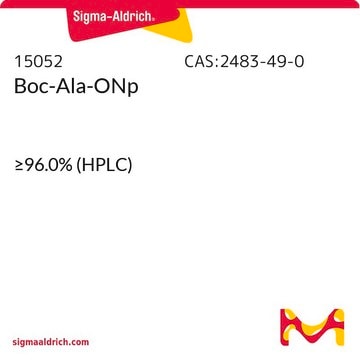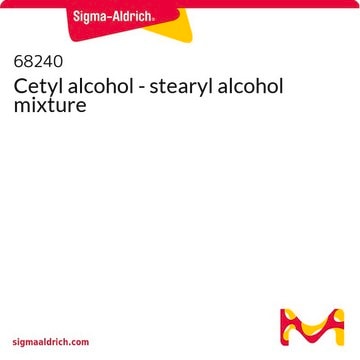W255408
1-Hexadecanol
≥99%
Sinónimos:
Cetyl alcohol, Palmityl alcohol
About This Item
Productos recomendados
biological source
synthetic
Quality Level
agency
meets purity specifications of JECFA
reg. compliance
FDA 21 CFR 172.515
vapor density
8.34 (vs air)
vapor pressure
<0.01 mmHg ( 43 °C)
assay
≥99%
autoignition temp.
483 °F
expl. lim.
8 %
bp
179-181 °C/10 mmHg (lit.)
mp
48-50 °C (lit.)
density
0.818 g/mL at 25 °C (lit.)
application(s)
flavors and fragrances
documentation
see Safety & Documentation for available documents
food allergen
no known allergens
organoleptic
waxy
SMILES string
CCCCCCCCCCCCCCCCO
InChI
1S/C16H34O/c1-2-3-4-5-6-7-8-9-10-11-12-13-14-15-16-17/h17H,2-16H2,1H3
InChI key
BXWNKGSJHAJOGX-UHFFFAOYSA-N
¿Está buscando productos similares? Visita Guía de comparación de productos
Categorías relacionadas
General description
Disclaimer
Storage Class
11 - Combustible Solids
wgk_germany
nwg
flash_point_f
Not applicable
flash_point_c
Not applicable
ppe
dust mask type N95 (US), Eyeshields, Gloves
Certificados de análisis (COA)
Busque Certificados de análisis (COA) introduciendo el número de lote del producto. Los números de lote se encuentran en la etiqueta del producto después de las palabras «Lot» o «Batch»
¿Ya tiene este producto?
Encuentre la documentación para los productos que ha comprado recientemente en la Biblioteca de documentos.
Los clientes también vieron
Nuestro equipo de científicos tiene experiencia en todas las áreas de investigación: Ciencias de la vida, Ciencia de los materiales, Síntesis química, Cromatografía, Analítica y muchas otras.
Póngase en contacto con el Servicio técnico









